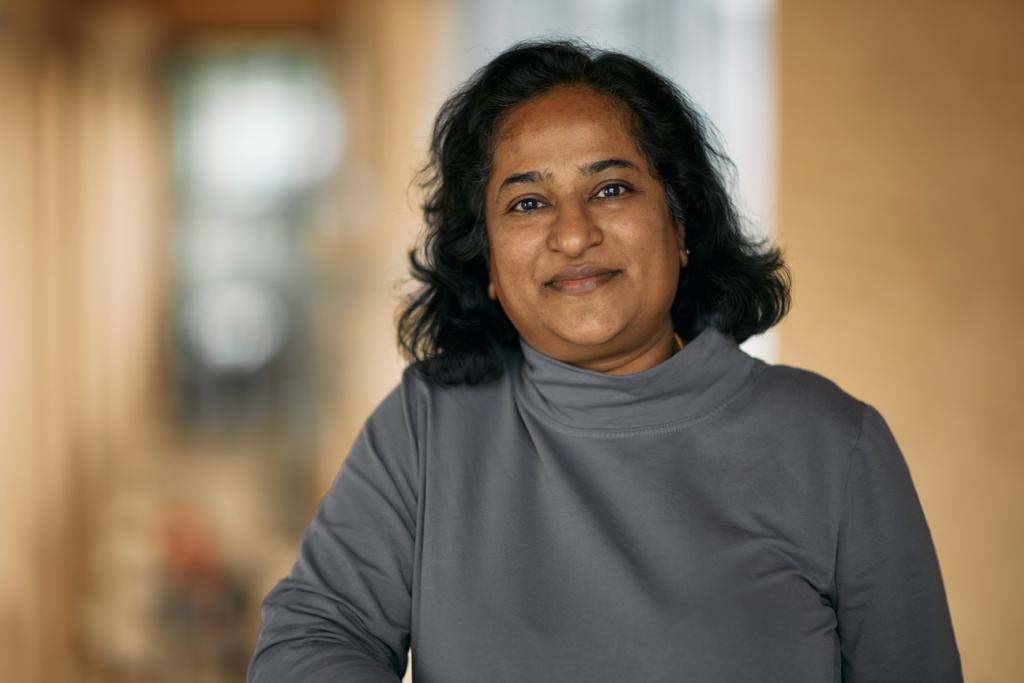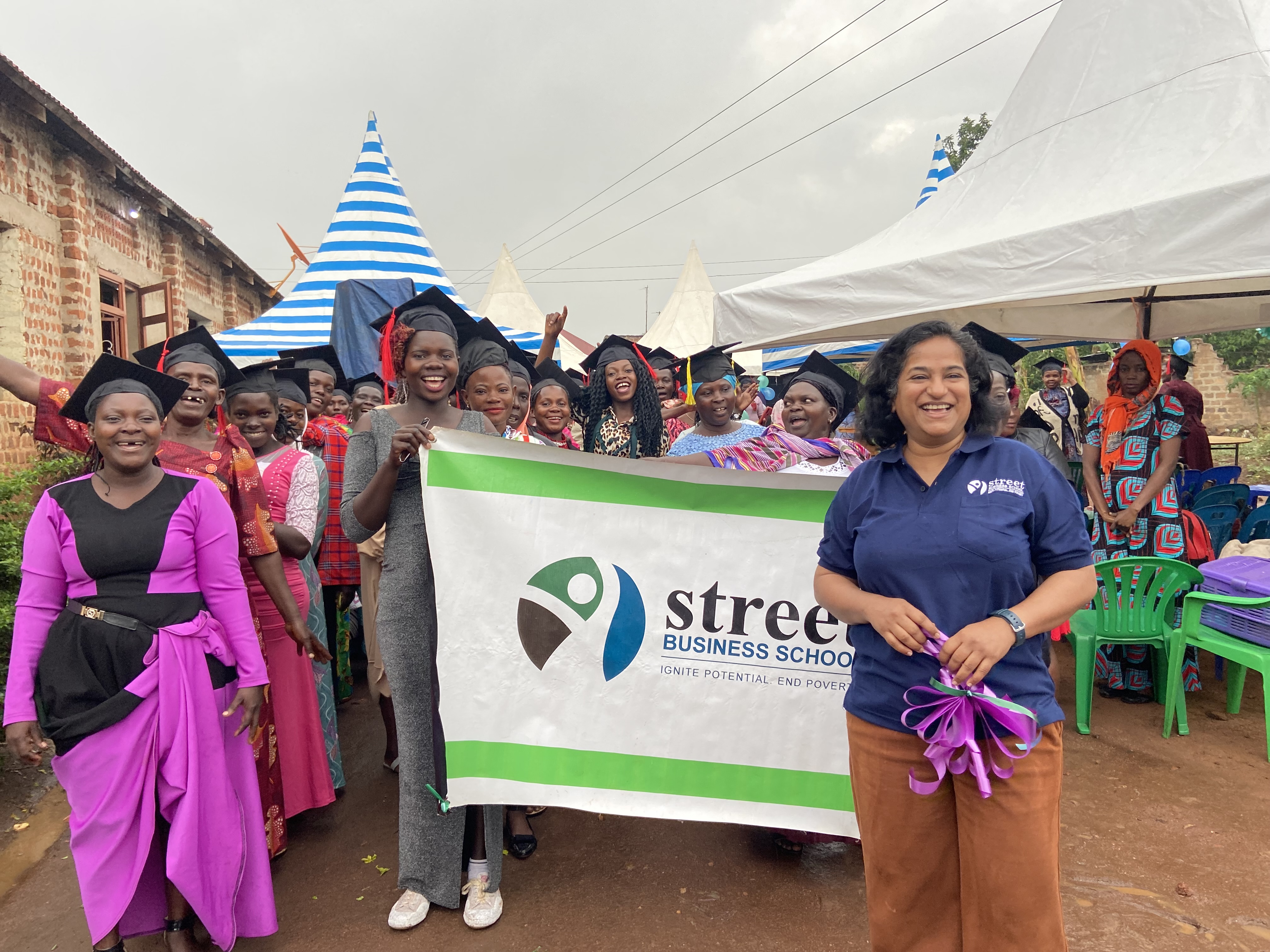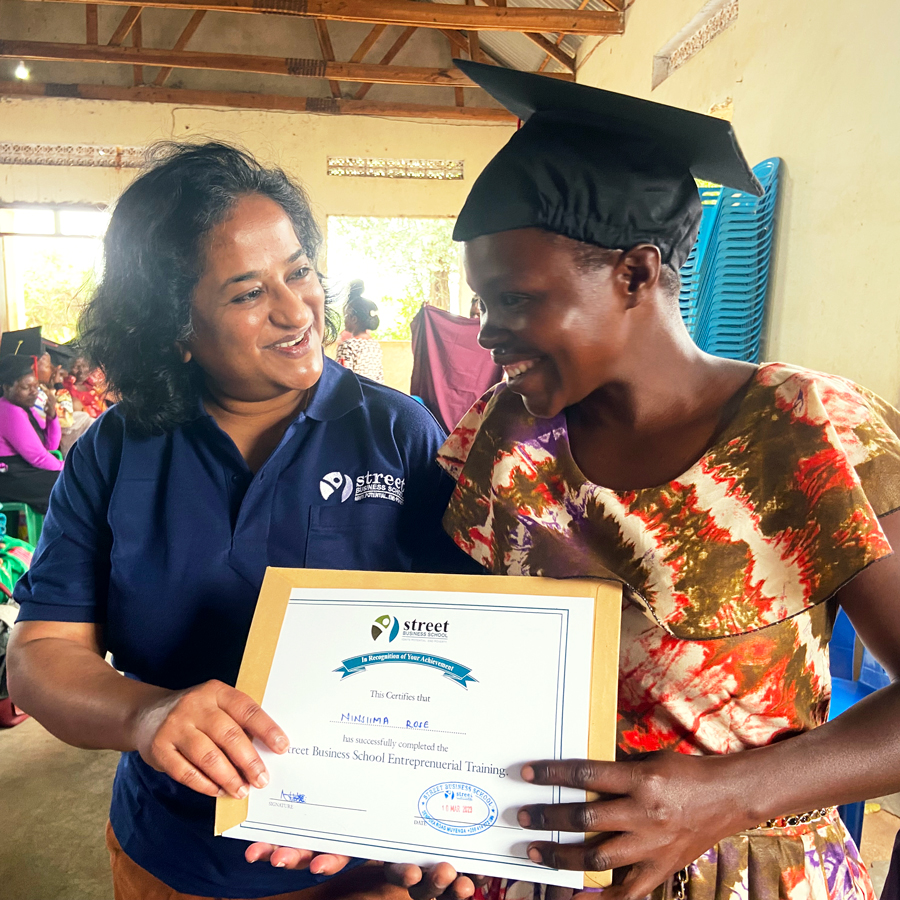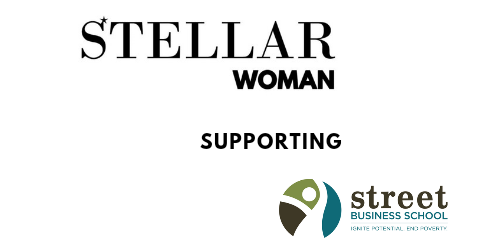Deepti Mathew is Street Business School’s new chief executive officer. She has over 24 years of experience helping leading organizations build the mindsets, systems, and processes necessary to achieve scale and impact. In this interview with Stellar Woman Magazine, she shares her experience empowering women to grow from poverty to wealth.

Who is Deepti Mathew, and what is your backstory?
I’m Deepti Mathew, a 50-year-old woman currently living in Dakar, Senegal. My backstory begins in a small town in the very south of India. At the age of two, my family moved to Tanzania, where I spent my early years. In those days, kindergarten wasn’t prevalent, so I stayed at home, speaking Swahili and my mother tongue. My early memories are of my time in Tanzania. Later, we moved to Cameroon, where I unlearned Swahili and learned French and English at the age of five. I lived there until I was about 13. Then, my father decided it was time to return home, which was Cameroon, not India. However, our family left Africa, and we moved back to India, where I completed my education, pursued an MBA, secured a good job, and worked in the private sector for an extended period. But I couldn’t shake the feeling that I was living someone else’s dream. Although I had remarkable jobs with companies like Unilever and renowned management consulting firms, the gap between who I was at work and my authentic self grew wider with each promotion.
I decided to take a career break during my successful career. I traveled from India to the UK to study gender and development at the London School of Economics. For the first time, I truly enjoyed education and the subjects I was learning. Growing up as a girl and a woman in India and Africa, I realized that societal, governmental, and religious influences shape your choices before you have a chance to decide. Therefore, gender and development became a subject close to my heart. My goal was to transition into a career in development. However, I was in the UK on a highly skilled migrant visa that required a high income. In 2012, as soon as I gained citizenship, I quit my job and took a career break. I ventured into the unknown by joining the Clipper Round the World Race, sailing around the globe. I had never been on a boat before, but I completed half the race from Australia to London in six months. This journey taught me valuable lessons about sailing, life, and teamwork. Afterward, I returned to London and successfully transitioned my career to the field of development, working with organizations in their growth-to-scale phases. My first significant opportunity was taking a UK-based NGO that supported government schools in India from working with 27,000 children to impacting 8 million children.
Finally, I achieved my dream by moving back to Africa. I worked with a high-tech startup in Ghana, where I was based in Accra. We provided highly accurate weather forecasts to over a million smallholder farmers in West Africa. Later, I moved to Dakar, where I worked with MyAgro, supporting smallholder farmers with access to high-quality seeds and fertilizers in various roles, including COO and Managing Director of Strategy. Afterward, I learned about Street Business School, an NGO dedicated to empowering women living below the poverty line. I was passionate about this work and the organization’s unique model, which allowed local NGOs to implement their curriculum. Eight months ago, I stepped into the role of the founder at Street Business School, and it has been an amazing journey.
What are your ideal stellar woman attributes?
I believe every woman possesses unique qualities and superpowers. For too long, women have been pressured to fit a predefined mold of what society expects from them. It’s time for us to find our own voices and truths, without conforming to others’ expectations. We should embrace our individual strengths. I believe that the power of sisterhood, women supporting women, is incredibly beautiful and impactful. If women support one another, the possibilities are boundless.
You have a strong conviction that women are key to changing the world, and your academic studies have focused on women. Could you elaborate on this?
My personal experiences and observations have shaped my perspective. The women who have been my role models are not only strong but have core values and resilience. From a business and economic standpoint, women have the potential to change the world. In many parts of the world, especially Sub-Saharan Africa and the Global South, women are disproportionately affected by poverty, lack of access to health, education, climate change, natural disasters, and conflict. Empowering women with opportunities and resources to improve their lives has a significant impact, not just on them but on their entire families and communities. By improving a woman’s status and giving her access to income, education, and resources, we can lift whole families out of poverty. Women are key to breaking the cycle of generational poverty and disadvantage.
What inspired you to take on the CEO role at Street Business School?
What drew me to Street Business School was that it resonated not only with my intellect but with my heart. Firstly, the organization had an exceptional curriculum backed by a randomized control trial, proving its effectiveness in creating lasting change. Street Business School doesn’t aim to be present in every country. Instead, it empowers local NGOs with its curriculum, making it a scalable and smart model. During the recruitment process, I discovered the organization’s values of leading with love, celebrating success, and fostering collaboration. These values were not just words on paper; they were genuinely lived by the people in the organization. Street Business School turned out to be a joyful and supportive place to work, which made me feel incredibly blessed to become its CEO. My heart and head both resonated with this role.

What, in your view, stops women from taking on leadership roles, and what can they do to overcome these barriers?
There are external and internal barriers to women taking on leadership roles. Externally, women often bear additional responsibilities, such as childcare and household work, making it challenging to balance work and family. Moreover, societal norms sometimes undervalue the strengths that women bring, like resilience, courage, and the ability to build and support communities. In many cases, the private sector tends to favor assertiveness and aggression, which may not be how all women naturally lead. We end up trying to emulate a different leadership style, instead of being authentically ourselves. However, I’m encouraged to see that these perceptions are slowly changing, and there’s more recognition for what women bring to the table.
Internally, women may doubt themselves, downplay their abilities, and keep their voices small due to a lack of self-belief. Society and family expectations have often made women feel they’re not good enough. That’s why sisterhood, women supporting women, is vital. Women can help each other become better authentic leaders.
What does wealth building mean to you?
I think that’s an excellent question. To me, wealth isn’t solely about the money sitting in a bank. In fact, money is often the least significant aspect of wealth. True wealth encompasses the value you’ve created throughout your life, whether that’s through experiences, relationships, or the support you’ve given to others. It’s what keeps you mentally strong, healthy, happy, and connected to the world. It’s far more than just the dollar bills stored in a cold, distant bank vault. It’s about how you’ve used your resources to make a difference, especially in the lives of others.
Are you able to share how you measure the impact of these programs?
Certainly, measuring the impact of our programs is crucial. We gather data from our NGO partners, providing them with monitoring and evaluation tools to collect this information. They supply us with this data, which we then analyze and use to help them assess their success. Key metrics include measuring increases in income, not just in terms of revenue, but how much money these women can take home, factoring in costs and expenses. We aim to double, or even more than double, their income over the course of a year and beyond. We also track how many of the women who attend our training actually go on to set up businesses. We conduct these assessments immediately after the training, during and after the course, and up to one or two years after completion. The results, including an 80% success rate, show that many women continue to operate at least one business, with some managing two or more even a year after their training.
How do the women qualify?
In Uganda, we train women directly. However, our belief is that we can have a more significant impact by training other NGOs and enabling them to run our programs successfully. This approach offers a more sustainable and scalable solution, without the need for our organization to expand to every country in the world. Often, partnering NGOs already have specific groups they serve or target communities. We typically select geographic areas based on specific criteria, such as agricultural regions or places heavily affected by climate change. We encourage women from these areas to join the program, and word of mouth tends to work effectively. Our team works in these villages, engaging with local leaders, including village chiefs, church leaders, and, where relevant, Imams. We run mobilization efforts that span a few weeks to generate interest among women in attending the program.

What is your perspective on the fear of failure, and have you experienced failure before?
I believe I’ve encountered failure far more often than success, and that’s true for most people who have achieved anything significant. One of my favorite quotes by Theodore Roosevelt, though I can’t recall the exact wording, speaks about “daring greatly.” It emphasizes that it’s not the critic who matters or the person sitting on the sidelines pointing out flaws. Instead, it’s the person in the arena, with dirt on their face, sweat on their brow, who has dared greatly and experienced failure, time and time again. It’s those who, despite their failures, have shown courage. In the end, we don’t carry our MBA or job title with us into our later years. What truly matters is the legacy of how we’ve created value in the world and how we’ve given back. I’ve tried following the MBA path, the hard-nosed professional route, and achieved success, but it didn’t resonate with me. I felt unhappy and used to cry constantly when returning home from work. The essential element is having the courage to acknowledge when something doesn’t align with your heart’s desires. You don’t need a degree for that; you need a little courage. And if you find yourself lacking that courage, remember that your sisters can provide the strength to help you find it.
What future do you envision for women?
I foresee a future where there’s a harmonious balance between authentic masculinity and authentic femininity, unburdened by rigid gender roles. It’s a future where women aren’t confined to predefined roles, whether it’s being mothers, cooks, homemakers, or CEOs. Instead, women will feel at ease in their own skin and will be free to embrace their authenticity. It’s a more connected future where these labels are less relevant, allowing people to define themselves in a way that feels true to them. I believe that Generation Z will play a significant role in leading us towards this future. They possess a strong sense of self and will be instrumental in driving positive change.
What advice would you share with your fifteen-year-old self?
This is a fantastic question because my fifteen-year-old self lacked confidence and felt lost and confused. I was trying to conform to the societal roles that had been laid out for me. If I could speak to my younger self, I would say, “It’s okay not to be what others expect you to be. There’s no joy, no happiness in that path, just anxiety, stress, misery, and a deep sense of failure. It may be challenging and lonely, but being true to yourself is far more fulfilling. Remember, you’ll have some amazing adventures along the way, so don’t worry, there’s fun in being yourself.”
Where do we see Deepti in the next 5-10 years?
Deepti is an adventurer at heart, and after sailing halfway around the world and conquering numerous mountains, she’s bound to seek new horizons. In the next 5-10 years, I’d love to explore Antarctica, as long as it can be done without harming the environment. I will continue my journey of learning and will always seek ways to add value to the lives of others, paying back more than the space I occupy on this planet.
Do you have any life mantra?
My sole life mantra is that if you hold a value, you should stand up visibly and publicly for it. For instance, if you believe in transparency, it’s easy to support it when things are going well. But the true test of your values is when you have the courage to stand up for them when transparency is lacking, especially during difficult times. It’s easy to embrace values in good times, but their real significance is evident when you uphold them in challenging situations.
Leave a challenge to women reading your story to guide them on their wealth-building journey?
I offer two pieces of advice. Firstly, start from where you are. Building wealth isn’t solely about reaching a grand future state. It’s about the small steps you take today to create that wealth. Whether it’s stopping something that doesn’t serve you or starting something new, even if it’s a small change, start from where you are. Secondly, create a vision or dream for the future. A clear vision makes your small steps more tangible and meaningful. Your dream paints a rich picture of what you’re working towards, which can be a powerful motivator and guide in your wealth-building journey.
TAP BELOW TO WATCH FULL INTERVIEW
